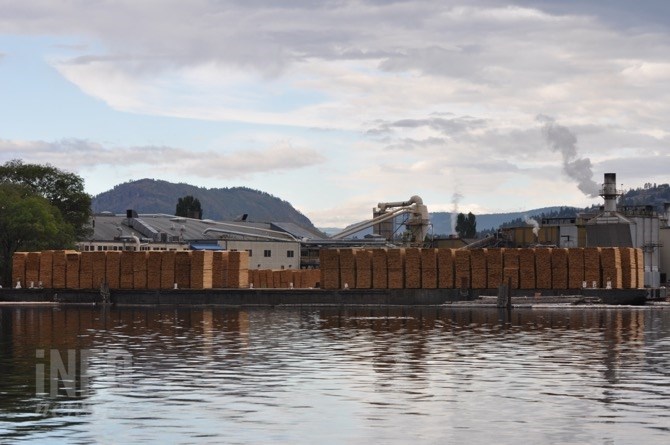
Tolko mill in Kelowna.
(JOHN MCDONALD / iNFOnews.ca)
November 21, 2019 - 11:30 AM
Sharron Simpson felt a loss for both her family and the community earlier this month when news of Tolko’s imminent departure from Kelowna was announced.
“It’s as though a bit of my family roots are being dug up," she said. “I was profoundly sad."
The sawmill where Tolko currently stands was started by her grandfather, Stanley Simpson, in 1931. It was a planing mill and box factory when it began and while it changed over time, for more than three decades it sustained her family and fuelled the local economy. Her family sold it in 1965 to an American company called Crown Zellerbach. Subsequent sales were to Fletcher Challenge/Crown Forest in 1983 and Riverside Forest Products.
Tolko, which took over in 2003, is the only one of those lumber companies still in business and it also fuelled the expansion of this city.
At its height it employed more than 500 people in Kelowna, working three shifts around the clock.
When its closure was announced, only one shift of around 200 remained — but they were 200 employees making around $60,000 to $70,000 a month, according to a union representative.
Whether that loss will be made up by any single employer again remains to be seen but Simpson, who authored the book about the local lumber industry called Boards, Boxes and Bins, doesn’t believe it will be that industry that comes in to save the day.
“The forest industry historically, expands, consolidates and contracts, it’s been that way all the time, and we’re currently in a period of contraction," she said, adding that log prices and damaged forests may keep it in contraction. That means the industry that provided a century of good steady jobs in the southern Interior may be gone.
“Families built their homes with those jobs and they sent their children to university with them.”
The city has grown and the big industries that once fed its residents — the sawmills, packing houses and canneries — are all gone.
“You look at what used to be in the industrial area of town it’s in transition,” Simpson said.
“Are big manufacturers going into this town? They’ve gone overseas, where the cost of labour cheaper. The packing house on Clement is now condos... the North End used to be industrial, but now it's industrial off by Sexsmith or the Airport and it’s not huge plants there anymore.”
With changing industries come changing demographics.
“The lifetime employer — where you start a job at 15 and keep it until retirement — is gone and now you probably need a reasonable education to get a job that’s other than at the car wash, or clerking. The unskilled economy is harder to get into because there aren’t many options if you don’t have some kind of educational background.”
While the mill’s loss will be felt around the region, what it did for the community over the last century won’t soon be forgotten.
“As a result of the sawmill, Kelowna has the Simpson Covenant and much of development on Knox mountain,” she said.
“So not only did the company provide jobs for many people and steady tax income from the city, there were many other businesses — the city has benefitted beyond jobs and the tax dollars.”
To contact a reporter for this story, email Kathy Michaels or call 250-718-0428 or email the editor. You can also submit photos, videos or news tips to the newsroom and be entered to win a monthly prize draw.
We welcome your comments and opinions on our stories but play nice. We won't censor or delete comments unless they contain off-topic statements or links, unnecessary vulgarity, false facts, spam or obviously fake profiles. If you have any concerns about what you see in comments, email the editor in the link above.
News from © iNFOnews, 2019